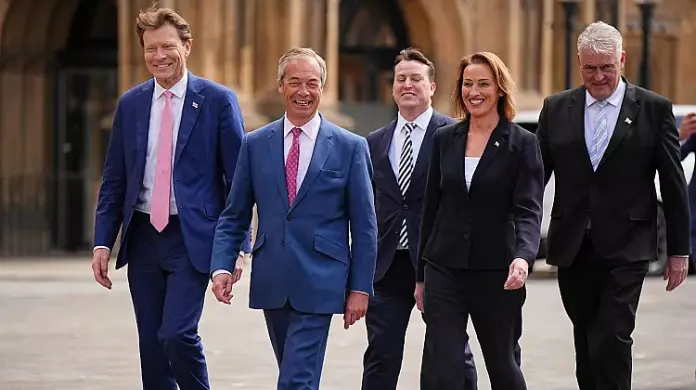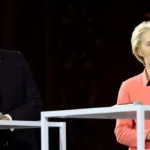
Is the UK’s Two-Party System Crumbling? Reform UK’s Rise Signals Political Upheaval
The dominance of Labour and the Conservatives—the twin pillars of British political power for generations—appears to be under growing threat. The recent success of Reform UK, a right-wing populist party led by Nigel Farage, has sparked renewed debate about whether the UK is witnessing the end of its traditional two-party system.
Last week’s stunning by-election result in Runcorn and Helsby provided a dramatic example. Sarah Pochin, the Reform UK candidate, narrowly overturned a Labour majority of nearly 15,000 votes, winning by just six ballots. The image of Farage triumphantly holding up six fingers to mark the slim margin quickly circulated online, becoming symbolic of a much larger political shift.
Read Also: UK Bans EU Meat and Dairy Imports: Travelers Risk £5,000 Fine for a Ham Sandwich
“This may be a small margin, but it’s a huge win,” Farage declared. Pochin’s election makes her Reform’s fifth MP—and its first female representative in the House of Commons.
But it wasn’t just a single seat that marked Reform’s arrival. In the local elections held the same day, the party gained control of 10 of the 23 councils being contested and won 677 of 1,600 council seats across England. Reform also topped the polls in two mayoral races, securing victories in Greater Lincolnshire and Hull & East Yorkshire. These gains were made at the direct expense of the two main parties: the Conservatives lost 674 council seats, and Labour shed 187.
Political commentators are increasingly asking whether this marks a fundamental change in the UK’s political structure. Tim Bale, Professor of Politics at Queen Mary University of London, believes the evidence is mounting. “The results confirm that we’re in an era of four or even five-party politics,” he said. “The fragmentation of the party system has been ongoing since the 1970s, but it’s accelerated in the past few years.”
Bale argues that Reform UK’s rise has been fuelled by widespread voter dissatisfaction with the traditional parties’ failure to deliver real improvements in daily life—particularly in areas like public services, economic security, and trust in leadership. This perceived failure has created fertile ground for populist movements that offer emotionally charged, direct rhetoric.
Though Reform’s advance spells trouble for both Labour and the Conservatives, analysts agree the threat is more severe for the latter. After being decimated in last year’s general election following 14 years in government, the Conservative Party now faces an existential crisis. Robert Ford, a political scientist at the University of Manchester, described their recent electoral performance as catastrophic.
“They went from being the party of everywhere in 2021 to the party of nowhere in 2025,” said Ford. “They got completely wiped out, losing every single council and 70% of their council seats.”
Labour, currently in power under Prime Minister Keir Starmer, may still have time to course-correct before the next general election, which is not legally required until 2029. But the party must deliver concrete results to retain its voter base and fend off Reform’s challenge.
Polling data supports this growing volatility: 26% of Conservative voters and 9% of Labour voters from 2024 say they would vote for Reform UK if a general election were held tomorrow, according to YouGov.
Even so, some political analysts caution against writing off the traditional parties too soon. “The two most-established parties in British politics have survived everything thrown at them for the past 120 years,” said Patrick English, Director of Political Analytics at YouGov. “But both face serious structural challenges they do not seem equipped to manage right now.”
Ford warned both parties not to imitate Farage’s approach—especially on contentious issues like immigration. “The Conservatives tried to offer a poundshop, knock-off Farage. But no one wants that. Why would you choose the copy over the original?” he asked. Labour, he added, must also avoid fighting Farage on his own turf. “This needs to be a home fixture, not an away fixture,” he said.
While Farage becoming Prime Minister remains unlikely for now, it is a more plausible scenario than ever before. Reform UK’s momentum has positioned it as a major player in Britain’s evolving political landscape—perhaps even the primary opposition force in the near future.





